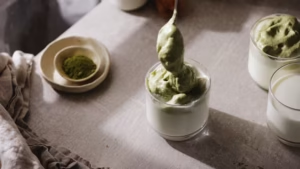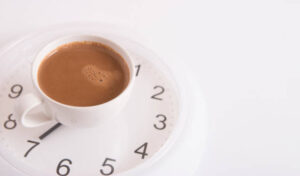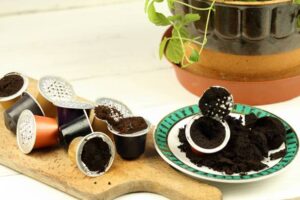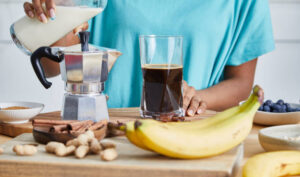For centuries, mushrooms have been celebrated for their various health benefits, but it wasn’t until the recent wellness wave that they found their way into your morning cup of joe. Mushroom coffee is not just another beverage trend like other specialty lattes; it’s a unique concoction believed by many to bring together the energizing properties of caffeine with the health-boosting potential of mushrooms. But does mushroom coffee pack the same caffeine punch as your regular latte or is it a milder wake-up call? In this comprehensive exploration, we’ll demystify the caffeine content in mushroom coffee and unravel its unique allure.

Table of contents
A Brief on Mushroom Coffee
Mushroom coffee is not your average latte. Unlike traditional coffee, where the name says it all, the term “mushroom coffee” can lead to misconceptions. While it does contain traces of mushrooms, its primary component remains coffee. This isn’t a hot mushroom tea — it still gives you that familiar coffee flavor and aroma, but with an added twist.
Mushroom coffee has been linked to various health benefits, such as improving focus, boosting the immune system, and promoting mental clarity. These perks come from the adaptogenic and nootropic properties of mushrooms, which are claimed to complement the energizing effects of caffeine. However, how much caffeine is in this seemingly health-forward brew?
Mushroom coffee is lauded as a healthier alternative to regular coffee, boasting medicinal mushroom extracts like reishi, chaga, cordyceps, and lion’s mane, which are known for their added health benefits. Although it’s currently a trending coffee blend among wellness enthusiasts, the concept of mushroom-based coffee-like beverages is far from new. According to online sources, mushrooms were used as a coffee substitute in Finland during World War II, when coffee beans weren’t readily available. This ingenuity reflected a tradition of resilience and adaptability. Furthermore, there’s an extensive history of the culinary and medicinal use of mushrooms in Asian countries, particularly within Chinese medicine. For centuries, these cultures have harnessed mushrooms for their nutritional and health-promoting properties, including immune system support, anti-inflammatory effects, and cognitive enhancement.
What is Mushroom Coffee?
If you visualize a cup of joe with mushrooms floating at the top — take a sigh of relief. That is not what this is. Mushroom coffee is a delicate blend of ground mushrooms and coffee beans combined to brew a dark, smooth, and nutty coffee. Unlike the typical image that might come to mind, mushroom coffee generally uses medicinal mushroom extracts rather than culinary mushrooms like shiitake and portobello. Common medicinal mushrooms used to make this trendy coffee include Chaga, Turkey’s tail, Lion’s mane, Reishi, and Cordyceps.
Several consumer reviews indicate that the flavor profile of mushroom coffee isn’t so different from that of regular coffee. However, the proposed health benefits of mushroom coffee, including reduced anxiety and improved immunity, give it a marketing edge. This unique mixture offers a twist on the traditional coffee experience while arguably enhancing overall well-being.

How is Mushroom Coffee Made?
The process of creating mushroom coffee begins with the extraction of fruiting bodies from specific medicinal mushrooms. These are carefully selected for their health benefits and then transformed into an organic powder, ensuring the product is free from unnecessary fillers, carriers, or additives. Utilizing a dual extraction method, these mushrooms are dehydrated and ground into a fine powder. This mushroom powder is then mixed with ground coffee beans to create the final product. The typical mixing ratio used is 1-to-1, balancing the flavors and properties of both components effectively.
Mushroom coffee is available in various forms to cater to different preferences and lifestyles:
- Instant coffee packets: for those seeking convenience and quick preparation.
- Ground coffee blends: for individuals who appreciate the ritual of brewing coffee.
- Coffee pods: compatible with coffee machines for ease of use and consistency.
Preparing mushroom coffee is as straightforward as making regular coffee, allowing for versatility in how it’s enjoyed. Whether you’re in the mood for a creamy latte, a rich mocha, or a simple cup of black coffee, mushroom coffee can be used to make all these beloved drinks, providing a unique twist on traditional coffee experiences.
The Caffeine Connection
Yes, mushroom coffee does contain caffeine, but the kicker is the source. The caffeine in your trusty morning mushroom blend hails from two main sources — the coffee itself and any additional compounds, like guarana, that might be present. Mushroom coffee blends often include medicinal fungi like chaga or lion’s mane, which aren’t caffeine powerhouses by any means, but still add up to the mix.
The caffeine content can vary depending on the type of mushroom coffee and the specific blend. For example, Chaga, one of the most common mushroom coffee ingredients, is caffeine-free, while lion’s mane carries no caffeine but boasts cognitive enhancements. Hence, the caffeine content in mushroom coffee usually comes from the coffee beans, keeping the jitters at bay for those sensitive to high caffeine doses.
Mushroom Coffee vs. Traditional Coffee: The Caffeine Showdown
If you’re accustomed to fueling your day with espresso or dark roasts, mushroom coffee might initially seem underwhelming in its caffeine punch. However, for many, this brew delivers a more sustained and balanced surge of energy. Traditional coffee can have a significantly higher caffeine content than mushroom coffee due to the varying ratios of coffee to mushroom extract in the blend. This means mushroom coffee can indeed offer a gentler energy lift that is less likely to lead to the post-buzz crash associated with heavy caffeine consumption.
Yet, for those seeking the pick-me-up power of caffeine, mushroom coffee is not a complete replacement for traditional options. It provides an alternative for those looking to reduce their caffeine intake or diversify their morning routine with a potential health boost.
It’s lower in caffeine than regular coffee
It’s undeniable that mushroom coffee offers a distinct advantage for those monitoring their caffeine intake, with blends generally touted as being lower in caffeine compared to conventional coffee. This attribute is particularly appealing to individuals sensitive to caffeine or those seeking to moderate their consumption for health reasons. Caffeine—a ubiquitous psychoactive substance—is naturally present in coffee beans, cocoa beans, tea leaves, and is sometimes synthetically added to various foods and beverages. Certain groups, including pregnant or lactating individuals, children, and those with existing heart conditions, are advised to be particularly wary of their caffeine consumption due to a heightened risk of adverse effects.
The daily threshold for caffeine intake sits at 400 mg, a level not typically associated with negative health impacts. However, for individuals possessing a heightened sensitivity to caffeine, even modest amounts can trigger undesirable reactions such as anxiety, a rapid heartbeat, stomach upset, among others. Mushroom coffee, by virtue of its preparation—mixing an equal measure of mushroom powder (which contains no caffeine) with ground coffee beans—effectively reduces the caffeine content of the final blend to approximately half that of traditional coffee. However, it’s critical to note the variability among brands concerning the exact caffeine content, which may not always be explicitly detailed on product packaging.
Below, we present a comparison highlighting the caffeine content in 1 cup (roughly 180 ml) across different types of mushroom coffee, alongside regular and decaffeinated coffee:
- Folgers Black Silk Dark Roast (Keurig pod): 100–150 mg
- Folgers Black Silk Decaf (Ground coffee): 1–4 mg
- Four Sigmatic Instant Mushroom Coffee with Lion’s mane (Instant): 50 mg
- Shrooms Reishi Mushroom Coffee (Instant): 53 mg
- Tiger 2 Mushroom Coffee Lion’s Mane + Chaga (Ground coffee): 60 mg
Thus, mushroom coffee presents a compelling option for those looking for a coffee alternative that’s lower in caffeine than traditional coffee yet contains more caffeine than decaffeinated varieties.
Expert Perspectives
To get a clearer understanding of how mushroom coffee’s caffeine content aligns with health claims, we turn to the professionals. While some acknowledge the benefits of key mushroom extracts, such as their antioxidant properties and their potential to improve mood, NO caffeine sources from mushrooms themselves are proven to health effects. Clinical Dietitian and health experts also highlight the importance of understanding individual product labels, as not all mushroom coffee is created equal.
They encourage consumers to consider the overall composition of the coffee. Are the mushrooms used organic? Were they grown in controlled environments? What is the extraction process for the mushroom content? These factors not only affect the benefit you’re seeking but also the final caffeine content of the blend.
User Testimonial Tales
The best way to know if mushroom coffee is worth the switch is to hear from those who have tasted the brew themselves. Users report a more balanced effect on their energy levels. They often note that while they do feel a caffeine-driven boost, it’s less intense and comes without the post-coffee crash. This subtle energy jolt seems to last longer and, paired with any reported mental clarity from the mushroom extracts, makes for a ride through your day free of the usual caffeinated rollercoaster.
Users sensitive to caffeine find it a friendlier option, allowing them to enjoy a cup in the afternoon or evening without the worry of a sleepless night. However, for die-hard caffeine seekers, a second or third cup may be necessary to reach the desired effect.
Choosing the Right Mushroom Coffee Product
Navigating the mushroom coffee landscape isn’t just about choosing between flavors; it’s about selecting a product that aligns with your health and caffeine consumption goals. Here are a few key points to consider when picking your mushroom coffee:
- Quality of the Coffee Beans: Opt for organic, shade-grown coffee to avoid the artificial chemicals often found in conventional coffee.
- Mushroom Extraction Methods: Brands that use hot water extraction tend to have higher efficacy but lower caffeine. Alcohol extraction methods might retain more caffeine but could lower the efficacy of the mushroom compounds.
- Supplier Transparency: Trustworthy brands will be transparent about where they source their mushrooms and their overall production process.
- Personal Sensitivities: Be aware of any allergies or sensitivities to the mushrooms used and always start with a small dose to gauge your body’s reaction.
Mushroom coffee is making waves among health enthusiasts and caffeine consumers looking for a departure from the traditional java jolt. Caffeine in mushroom coffee is a mixed bag, with the majority being from good old coffee beans. The unique selling point here is the blending of this caffeine with potential mental and physical perks from mushroom extracts, offering a possibly healthier and certainly different caffeinated experience.
It’s clear that while mushroom coffee may not serve the heavy hit of caffeine that some traditional coffees do, it does offer a gentle alternative that is worth considering for those on a wellness quest. Before you take your first mindful sip, be sure to do your research, consult health professionals if necessary, and source a high-quality blend. And remember, as with any health or wellness product, moderation is key. Enjoy your mushroom coffee and the new perspective it brings to your daily routine!






